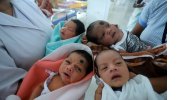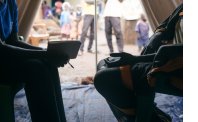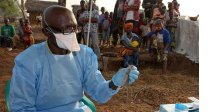Feedback/Comments from Our Readers
|
 Comments, questions and feedback is always welcome. Comments, questions and feedback is always welcome.
|
|
Global Health Rounds - March 26, 2018
|
Global health rounds will be presented by SIHA's International Members. More details next week to follow.
We're always looking for new speakers and ideas for topics for Global Health Rounds for the new coming up academic year in the Fall 2018. If you have speakers or topics, please contact Cheryl Knowles at GHFoMD@ualberta.ca. |
|
In Poor Countries, Anti-smoking Activists Face Threats and Violence
|
Eight years ago, more than a dozen men with AK-47s shot their way into Akinbode Oluwafemi’s home in Lagos, Nigeria. They killed his house guard and his brother-in-law, and briefly held a muzzle to the head of one of his year-old twins.
“I do not know why I was not killed that day,” said Mr. Oluwafemi, who as deputy director of Environmental Rights Action/Friends of the Earth Nigeria has been one of his country’s leading antismoking activists.
He was one of several tobacco control advocates at last week’s 17th World Conference on Tobacco or Health in Cape Town who in telephone conversations described violence or threats they faced as they fought the expansion of smoking in their countries.
No arrests were made in any case, and none of the victims could prove that the men assaulting or threatening them worked for the industry. But the pattern was consistent.
To read more about this article go to https://www.nytimes.com
|
|
Mineral deficiency exposes 19 million babies a year to brain damage risk
|
 A lack of iodine in pregnancy and early childhood puts nearly 19 million babies around the world at risk of permanent but preventable brain damage every year, a new report has warned. Insufficient iodine during pregnancy can adversely affect neurological and psychological development, reducing a child’s IQ by eight to 10 points.
More broadly, widespread iodine deficiency can diminish the cognitive capital of entire nations, diminishing socio-economic progress, experts claim. A global movement to add small amounts of iodine to edible salt has been successfully addressing the problem of iodine deficiency since the mid 1990s, protecting the developing brains of children worldwide.
However, research published on Thursday revealed more work is needed to tackle the issue, with 14% of babies born globally still at risk of preventable brain damage. Over the past decade, the UN children’s agency, Unicef, has been working in tandem with the Global Alliance for Improved Nutrition (Gain) to tackle iodine deficiency.
To read more about this article go to https://www.theguardian.com/
|
|
Vulnerable to Violence: Empowering Women in South Sudan
|
 “People react differently. Some isolate themselves from friends and family members and need emotional support, others need referring to hospital for medical attention. Sometimes women need protection or legal support. This is where we come in. We know what support needs providing and who can provide it. But we do not force people. Through counselling we help them make their own decisions.”
In response to the alarming rates of violence against women, with reports suggesting 475,000 women and girls are at risk [1], UNDP is working in partnership with the Government of South Sudan, the Global Fund and the International Organization for Migration (IOM) to address gender-based violence as part of mental health and psychosocial support programmes, particularly for women displaced by the three-year conflict. This is particularly important as violence can affect women’s physical, mental, sexual and reproductive health, and may increase vulnerability to HIV.
“We run support groups which include women and mothers living with HIV, and often the HIV may be the result of sexual abuse. They come together to talk about their experiences, how they felt alone in their homes before and were just waiting to die. Since joining the group, after a few months you see the women start to talk about how they feel and they can move on and join in again. Eventually they are also able to help others,” explained Viola, who works as a project assistant for the IOM mental health and psychosocial support programme.
To read more about this article go to http://womendeliver.org
|
|
Health workers scramble to contain deadly rat-borne fever in Nigeria
|
 By early January, it was clear something “really, really extraordinary” was going on in Nigeria, says Lorenzo Pomarico of the Alliance for International Medical Action (ALIMA). Cases of Lassa fever, a rare viral hemorrhagic disease, were skyrocketing across the country—more were recorded in the first 2 months of this year than in all of 2017. Unprepared for a disease that has no vaccines or drugs for treatment and kills 20% to 30% of those it sickens, eight health care workers were infected early on and three died. “Something was going very wrong with the outbreak,” Pomarico says. By early January, it was clear something “really, really extraordinary” was going on in Nigeria, says Lorenzo Pomarico of the Alliance for International Medical Action (ALIMA). Cases of Lassa fever, a rare viral hemorrhagic disease, were skyrocketing across the country—more were recorded in the first 2 months of this year than in all of 2017. Unprepared for a disease that has no vaccines or drugs for treatment and kills 20% to 30% of those it sickens, eight health care workers were infected early on and three died. “Something was going very wrong with the outbreak,” Pomarico says.
Since then, the situation has only gotten worse. The rodent-borne disease is endemic in Nigeria and several other West African countries, fluctuating with the seasons and usually causing “a trickle” of cases a year, says Chikwe Ihekweazu, who heads the Nigeria Centre for Disease Control in Abuja. But as of 4 March, 353 cases had been confirmed across 18 states, with about 700 suspected cases, and 110 deaths. Ihekweazu says the record-setting figures are sure to be underestimates, because the disease is maddeningly hard to diagnose, and many cases go unreported.
Already, Nigeria’s fragile health care system is overwhelmed. The one dedicated Lassa fever ward in the country at Irrua Specialist Teaching Hospital has just 24 beds. Without access to proper training, health care workers continue to become infected—by now 16 cases have been reported, with one additional death.
To read more about this article go to http://www.sciencemag.org
|
|
For Decades, Our Coverage Was Racist. To Rise Above Our Past, We Must Acknowledge It
|
 It is November 2, 1930, and National Geographic has sent a reporter and a photographer to cover a magnificent occasion: the crowning of Haile Selassie, King of Kings of Ethiopia, Conquering Lion of the Tribe of Judah. There are trumpets, incense, priests, spear-wielding warriors. The storyruns 14,000 words, with 83 images.
If a ceremony in 1930 honoring a black man had taken place in America, instead of Ethiopia, you can pretty much guarantee there wouldn’t have been a story at all. Even worse, if Haile Selassie had lived in the United States, he would almost certainly have been denied entry to our lectures in segregated Washington, D.C., and he might not have been allowed to be a National Geographic member. According to Robert M. Poole, who wrote Explorers House: National Geographic and the World It Made, “African Americans were excluded from membership—at least in Washington—through the 1940s.”
To read more about this article go to https://www.nationalgeographic.com
|
|
|
|
Save the Dates of Local Events!
|
Annual Rich Man Poor Man Dinner Event 2018
April 7, 2018
Time: 6:00 pm to 9:30 pm
Please note if you have any resaleable items for the SIHA silent auction, please email me at GHFoMD@ualberta.ca. Thanks for those who donate. |
|
Conferences, Symposiums & Lectures
|
Save this link to your favorites as I update it daily will all events, symposiums, etc., just click here.
=========================
Global Health & Innovation Conference
April 14-15, 2018
Yale University
New Haven, CT
|
|
Call for Abstracts/Submissions
|
Global Health & Innovation Conference at Yale on
April 14-15, 2018
is calling for abstracts.
|
|
Newsletter & Special Journal Editions
|
|
|